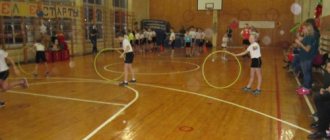Class hour on etiquette, 4th grade. Rules for communicating with people
Round table for younger schoolchildren “Rules that are important for everyone”
Description: This material will be useful for primary school teachers for extracurricular activities. By conducting this activity, children will understand that they need to be polite in various situations. Goal: to expand students' knowledge about communicating with people. Objectives: to introduce useful recommendations on communication with people, to promote kindness, sensitivity, and delicacy; develop polite communication skills. Equipment: questionnaire, sheet of paper, statements by J. Rousseau and N. Cervantes Teacher
Each person is unique, but in order to shine in its full glory, one must learn the rules of culture - only then will a person be for the people.
A student can study well, even excellently, but in everyday life he is sloppy and rude to his friends. What does it mean to “behave culturally”? (Students express their opinions).
How do you understand the word “communication”?
Teacher Communication
is the interaction of two or more people who exchange information or contact in the process of practical activity.
Communication is not only contact between people who get to know each other, exchange information and emotions in order to explain themselves and regulate their own behavior, but also the main condition and method of personality development. Why don’t people know how to communicate, push each other away, are afraid to open up? Therefore, the main goal of our work today is to learn the rules of etiquette and get acquainted with useful recommendations on communicating with people. In the medieval chivalric romances about King Arthur, it is said that at royal banquets, knights sat at a round table so that there would be no disputes over who sat at the honorable end of the table and who got the dishonorable place. Subsequently, the round table became an indispensable attribute at international conferences and diplomatic negotiations. The expression “sit at the round table” now means to begin a friendly exchange of views, peaceful negotiations. We have a great opportunity to sit down at our impromptu round table for a serious conversation about the rules that are important to everyone. The motto of our class is “Long live politeness and kindness!” Let friendly faces live!” Teacher
You and I communicate every day with other people: relatives, teachers, classmates, strangers. Does this communication always bring pleasure, joy, consolation? Of course not. It's nice to communicate with polite people.
Stage I “Welcome”
An important element in communicating with people is greeting. With its help, contact is established between people. Therefore, not knowing the forms of greeting means being a stranger to everyone, not being able to communicate. A polite person should not just respond to a greeting, but should use a special formula for each occasion in his response. How do we greet today?
Stage II “Acquaintance”
It happens in a person’s life that he is forced to break away from his family and close friends and build his life next to strange strangers.
The first acquaintance is very important at this stage. It is this that reveals Man. Let's start our meeting with introductions. (Everyone takes turns saying their name, age, hobbies, dreams)
1. Viewing and analyzing the miniature dramatization “The children were late for lessons...” 2. Working with the dictionary “Polite person... What is she like?”
Task.
Choose words that can describe a polite person
Teacher
Introduce students to the meaning of the word “politeness” and statements.
J. Rousseau and N. Cervantes. True politeness is about treating people kindly. J. Rousseau Nothing costs us so little and is valued so dearly as politeness. M. Cervantes Politeness
is a moral quality that characterizes a person for whom respect for others has become the norm of behavior and a habitual way of communication.
This is an elementary requirement of cultural behavior. Drawing up rules of communication. First rule. Before you do anything, ask yourself if you would like to feel the consequences of your action. Treat others the way you would like to be treated. First rule: Love yourself and those around you. Remember that any person needs love, positive evaluation and approval of their actions no less than you. Second rule: Strive to find something good in all people without exception. Third rule: Don't be offended. Give up revenge, do not accumulate evil within yourself, learn to forgive yourself first of all, and then others. Solutions to moral problems: 1. Oleg met Nadezhda at the door. What should he do? 2. Is it necessary to say hello when entering a store or library? 3. Two students are walking down the street, one of them says hello to friends. Should a second student who doesn't know him say hello? 4. The attendant needs to immediately contact the teacher, and at this time she is talking with Lenochka’s father. Which exit? 5. The teacher gives Yura a task: “Yura, please go to the teacher’s room and bring the magazine.” Explain how this should be done? Teacher
And now I invite you to fill out a survey.
(Questionnaire)
1. List all the words - greetings that you know?
2. Name all the words - goodbyes that you know? 3. What are all the words of apology that you know? 4. Name all the words - requests that you know? 5. What words - wishes do you know? List them. When communicating with people, it is important to give a positive assessment of qualities and actions, that is, to give compliments. Therefore, I offer you a very interesting work called “Five Kind Words.” Participants are divided into subgroups of 5 people. Teacher
Each of you should outline your hand on a piece of paper.
And write your name on your palm. Pass your sheet to the neighbor next to you, and you yourself receive such a drawing from the neighbor on the left. In one of the “fingers” of someone else’s drawing, write something pleasant about the qualities of its owner. (For example: “You are sensitive”, “You are frank”, “You write good poetry”, etc.) Another makes a note on the next “finger” and so on until the “hand” returns to the owner. Leaves are being collected
And now I will read out the compliments, and you will tell me who it concerns.
Final part
Teacher
Children, our round table meeting is coming to an end.
I hope that it was not in vain. I sincerely believe that you will all become polite people, that using polite words will become the norm in your life, and that your polite actions will bring joy to others. Let's express wishes to each other in the form of the game “Wishes” Throw the ball to the participant to whom you express wishes. Thank you for your attention!
We recommend watching:
Class notes on the topic: My family is my wealth, 4th grade Summary of an ethical conversation with primary school children A poem about etiquette for younger schoolchildren Class hour in primary school. Ethics rules
Similar articles:
Extracurricular activity. Culture of communication, grades 1-2
Conversation about goodwill and indifference for elementary school students
A conversation about friendship and camaraderie for elementary school students
Conversation for primary schoolchildren on the topic: Etiquette. Abstract
Etiquette for junior schoolchildren. Extracurricular activity



